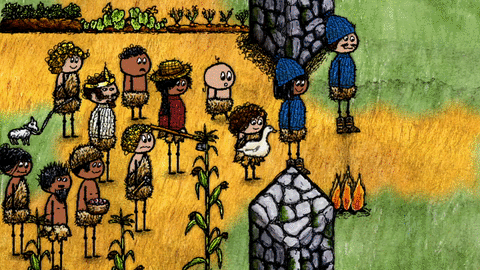Update: Dogs and Donkeys
September 14, 2018

Are you a pie gobbler? Tool hider? Seed thrower? Forest chopper? Congratulations! You just won an all-expense paid trip to Donkey Town. There, you will find a paradise where you and your fellow pie gobblers can gobble each other's pies for hours of endless, giddy enjoyment.
There will also be dogs. Too many dogs, from early reports. Not just in Donkey Town, but everywhere. Did you ever read the book "Go Dog. Go!" by P. D. Eastman? We're talking more dogs than that, even. Perhaps we will add "dog-overbreeder" to the list, and you can hop on that train to Donkey Town with the rest of them.
The clicking user interface for the backpack, when you're holding food in your hand, has been improved. Left-clicking on the pack puts food into the pack, right-click swaps the food with the bottom item in the pack, and left-clicking on yourself causes you to eat the food.
| Update: Friends and Strangers
September 8, 2018

I have returned from my family vacation, and I've brought you home an update.
First, two new characters, from two new skin tones.
Then loads of bug fixes and little improvements. You can now right-click to swap what you're holding with items in your backpack. Some glitches in baby naming have been fixed. At least one cause of the bouncing-forever bug has been found and fixed. Flying objects, when you pick something up and then immediately walk away, have been fixed to snap right to you as soon as you start moving. You can no longer steal backpacks from old people by swapping their pack with another pack.
Finally, last week, you may have experienced a few deadly "lag waves," where everyone on the server freezes for 30+ seconds, and then suddenly the connection comes back. Depending on hunger status at the time of the temporary outage, a whole village could potentially be wiped out. I traced this issue to some kind of networking problem with my hosting provider. They investigated, and decided to perform an emergency migration of Server1 to a different hardware node. Hopefully, the problem should be fixed.
| Update: Written Word
August 23, 2018

You can write now.
You need to make paper first, and something to write with, of course. And like little Cupid, you can now send someone a Valentine message by air mail.
There are also a bunch of things that are now stackable that weren't before, like kindling, ore, and dishes.
After 24 weeks of updates, I'm off on vacation. There will be no update next week.
| Update: Roads and Rails
August 18, 2018

New transportation systems. Roads and rails.
I've also reduced the distance in the Eve spreading algorithm by a factor of two, so it should be more realistic to travel between towns and connect them with roads.
One more update, next week, and then I'm taking a much needed family vacation for a few weeks. There have been weekly updates for 22 weeks in a row at this point.
| Update: Bison and Butter
August 11, 2018
This is the first substantial content update in a while.
The past few weeks have had me focused on rooting out the causes of server lag issues. After testing various solutions on Server1, the issues were finally resolved. Earlier this week, the final replacement database engine was rolled out to all fifteen servers, allowing us to push the player population cap up to 200 per server.
After that, I returned my focus to content. I've been wanting to add more animal husbandry for a while, and this update gives you a new one to domesticate. And what good is butter if you don't have anything to spread it on?
|
|
|